Sorry, Getting the Best Bang for Your Fertilizer Buck has passed.
Sorry, Keeping Hay Fields Productive has passed.
Sorry, Corn Nematode & Weed Management in Hay and Pasture has passed.
Sorry, Factors Influencing Forage Digestibility and Feed Quality has passed.
Sorry, Field Crop Disease Update & Soybean Cyst Nematode has passed.
Sorry, Herbicide Resistant Weeds & Seed Corn Maggot has passed.
Sorry, GMO Trait Management & Field Crop Weed Control has passed.
SWNY Virtual Field Crops Congress 2022
An eight part virtual series for Field Crops Producers to learn more about the latest research-based recommendations for pest control, weed management, forage production, economic considerations, soil health and fertility, challenges for our 2022 season, and more.
COST: $40/farm for access to any and all of the virtual sessions. Scholarships available for those who are in need who would like to attend for $20 or for free. Select the "scholarship" option at payment.
REGISTRATION: Complete the form below or call Kelly Bourne, administrative support, at 585-268-7644 or email klb288@cornell.edu.
PLEASE NOTE: we will NOT be recording these sessions. Every effort will be made to connect those who are unable to attend live with the session resources and slides.
IN-PERSON VIEWING OPTIONS available at one of our local CCE offices upon request. Participating offices are located in East Aurora, Jamestown, Ellicottville, Belmont, and Bath.
DEC AND CCA CREDITS AVAILABLE: Let us know at registration that you need credits and be prepared to share your Certification Number. Approved for 11.5 CEUs (1 Nutrient Management, 8 Integrated Pest Management, 1.5 Crop Management, 1 Professional Development).
TECH REQUIREMENTS: You will need access to Zoom (phone, tablet, or computer). If you need credits, you'll also need video capabilities.
SPONSORSHIP: We are currently seeking agribusiness support for this series. Contact Katelyn at 716-640-0522 for more information.
IS THIS FOR ME? This series has options for agricultural producers of all shapes, sizes, and time in business. Choose the options that best suit your interests and needs.
FOR ACCOMMODATIONS and accessibility concerns, please contact Katelyn Walley-Stoll by calling 716-640-0522.
Event Details
Date
March 10, 2022
Time
12:30pm - 1:30pm
Location
Virtual via Zoom or one of our in-person viewing locations
Cost
Regular Registration - per Farm (For the entire series) : $40.00
One price to attend all sessions
1/2 Scholarship - per Farm (For the entire series) : $20.00
1/2 priced registration - per Farm
Full Scholarship - per Farm (For the entire series) : Free
Free for those experiencing financial hardship (no documentation needed) thanks to our sponsors!
Host
Southwest New York Dairy, Livestock and Field Crops ProgramNavigating, Valuing, and Negotiating Land Leases
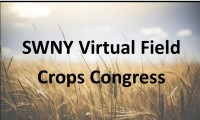
As farm profitability margins tighten, and input prices continue to rise, now's the time to evaluate the role that leased and rented land plays in your crop production - and the effect on your bottom line. Join Farm Business Management Specialist, Katelyn Walley-Stoll, to learn more about the considerations and resources that are available for evaluating and executing your land lease options. Topics of discussion include written lease agreements, "fair" rental rates, and tools for analyzing enterprise opportunities.
(1 Professional Development CEU)
Event Details
Date
March 11, 2022
Time
12:30pm - 1:30pm
Location
Virtual via Zoom or one of our in-person viewing locations
Host
Southwest New York Dairy, Livestock and Field Crops ProgramGetting the Best Bang for Your Fertilizer Buck
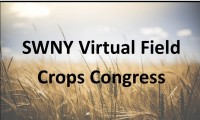
Dr. Quirine Ketterings, Cornell Professor and leader of the Nutrient Management Spear Program, and Kirsten Workman of Cornell PRO-DAIRY, will discuss management and evaluation strategies to help optimize fertility without breaking the bank with your fertilizer budget.
(1 Nutrient Management CEU)
Event Details
Date
March 17, 2022
Time
12noon - 1pm
Location
Virtual via Zoom or one of our in-person viewing locations
Host
Southwest New York Dairy, Livestock and Field Crops ProgramKeeping Hay Fields Productive
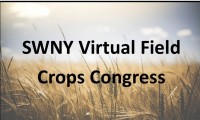
(DEC Pesticide Credits Pending)
Dan Steward of WNY Crop Management Association, will address the challenge of keeping long term pastures and hay fields. Discussion of how to deal with established weeds, while keeping pastures and hayfields viable in this regard will be covered. He will show how to better manage via rotation, fertility and harvest management to help control and eliminate weed growth. Problem weeds typically found in pastures and long-term fields will be identified and covered along with what types of herbicides should be used and timing for best possible effectiveness and animal safety.
(0.5 Integrated Pest Management and 0.5 Crop Management CEU)
Event Details
Date
March 18, 2022
Time
12noon - 2pm
Location
Virtual via Zoom or one of our in-person viewing locations
Host
Southwest New York Dairy, Livestock and Field Crops ProgramCorn Nematode & Weed Management in Hay and Pasture
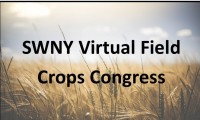
(DEC Pesticide Credits Pending)
Corn Nematode Survey Results: Management Implications?
Mike Stanyard will discuss the results of the corn nematode sampling study from the NWNY region in 2021. We will look at what plant parasitic nematode species were found and at what levels. Some fields were over threshold and therefore possible nematicide management options will be discussed for 2022. Mike is the Field Crops Specialist and Team Leader with Cornell Cooperative Extension's Northwest New York Dairy, Livestock, and Field Crops Program.
Weed Management in Hay and Pasture
This session will provide a review of cultural and chemical weed control practices for alfalfa or grass, mixed stands, and pasture. It will include practices that give the hay species a competitive edge over weeds and herbicide options for different weed scenarios. Common difficult to control weeds in pasture will be covered as well as improvement of older hay stands with weed invasions. Janice Degni is the Field Crops Specialist and Team Leader with Cornell Cooperative Extension's South Central New York Dairy and Field Crops Program.
(1.5 Integrated Pest Management CEU)
Event Details
Date
March 24, 2022
Time
12noon - 1pm
Location
Virtual via Zoom or one of our in-person viewing locations
Host
Southwest New York Dairy, Livestock and Field Crops ProgramFactors Influencing Forage Digestibility and Feed Quality
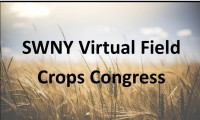
Advancements in measurements of forage fiber digestibility and a growing understanding of field and management factors that affect digestibility offer the opportunity to improve our management and utilization of forages in dairy rations. This talk will cover factors, from crop type to weather, that affect forage digestibility and overall quality as well as considerations for harvest, storage and feedout management to optimize the use of forages in a feeding program. Led by PRO-DAIRY's Joe Lawrence.
(1 Crop Management CEU)
Event Details
Date
March 25, 2022
Time
12noon - 2pm
Location
Virtual via Zoom or one of our in-person viewing locations
Host
Southwest New York Dairy, Livestock and Field Crops ProgramField Crop Disease Update & Soybean Cyst Nematode
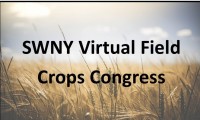
(2 DEC Credits in 1a, 21, 23)
Field Crop Disease update: corn tar spot, mycotoxins, and more…
Gary Bergstrom will provide an update on the diagnosis and management of field crop diseases in New York including two new corn diseases (tar spot and bacterial leaf streak), corn mycotoxins, soybean cyst nematode, and latest options for disease management in corn, soybean, and small grains. Presented by Gary Bergstrom, Professor, School of Integrative Plant Science Pathology and PlantMicrobe Biology Section.
Soybean cyst nematode in NY: Status update and management options
Soybean cyst nematode (SCN) is the most damaging pest of soybeans globally, and we are just beginning to identify its expansion into dry bean crops. In this presentation I will discuss SCN damage to crops, the latest statewide survey results, and the latest management options. Presented by Erik Smith, Area Field Crop Specialist with Cornell Cooperative Extension's Central New York Dairy, Livestock, and Field Crops program.
(2 Integrated Pest Management CEU)
Event Details
Date
March 31, 2022
Time
12noon - 2pm
Location
Virtual via Zoom or one of our in-person viewing locations
Host
Southwest New York Dairy, Livestock and Field Crops ProgramHerbicide Resistant Weeds & Seed Corn Maggot
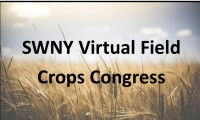
(DEC Credits Pending)
Herbicide Resistant Weeds in Agronomic Crops, Herbicide Shortages, and Novel Weed Control Strategies
This presentation will focus on the evolution of herbicide resistance in agronomic crops with a focus on the current issues facing New York producers including: Palmer amaranth, waterhemp and horseweed. Results from recent studies indicate that all three species are likely resistant to glyphosate and the ALS-inhibiting herbicide chemistries. The presentation will also include information about projected herbicide shortages and their impacts on weed control success. The talk will conclude with discussions about novel technology being investigated in the US for the control of herbicide resistant weeds (electrical weeding, harvest weed seed control) as well as easily implemented strategies on growers own farms, such as combine cleanout. Presented by Lynn Sosnoskie, Assistant Professor for Weed Ecology and Management for Specialty Crops at the School of Integrative Plant Science, Cornell AgriTech.
Seed Corn Maggot in NY Corn and Biological Control of Corn Rootworm
This talk will explore two topics. The first topic addresses the need for seed treatments to prevent stand losses from Seed Corn Maggot and the second topic addresses the use of persistent biocontrol nematodes (entomopathogenic) to control corn rootworm. A single application results in multi-year pest suppression. Presented by Elson Shields, Professor of Entomology at Cornell University.
(2 Integrated Pest Management CEU)
Event Details
Date
April 1, 2022
Time
12noon - 2pm
Location
Virtual via Zoom or one of our in-person viewing locations
Host
Southwest New York Dairy, Livestock and Field Crops ProgramGMO Trait Management & Field Crop Weed Control
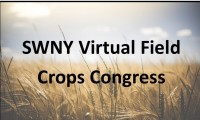
(DEC Credits Pending)
Alphabet Soup - GMO Trait Management
The options for pest management traits in genetically engineered crops can be confusing and continues to change. Understanding and managing these traits is critical to responsible and sustainable pest management. This talk will help decipher the list of traits from different companies and for various pest addressing trait stewardship to assure target use and minimize the risk of resistance development. Furthermore, how the use of traits can complement the responsible use of pesticides will be discussed. This presentation will be led by Joe Lawrence, Dairy Forage Systems Specialist with Cornell PRO-DAIRY.
Field Crop Weed Control in 2022
Limited availability of certain herbicides will likely change the herbicide programs used to control problematic weeds of field crops in NY. Putting together a sound weed management program in 2022 will be discussed. Up-to-date information about the status of herbicide resistant weeds in New York, including effective herbicide resistant weed control strategies and how to prepare for and manage resistant weeds on your farm. Presented by Mike Hunter, Field Crops Specialist with Cornell Cooperative Extension's North Country Regional Agriculture Team.
(2 Integrated Pest Management CEU)
Upcoming Events
Cornell Seed Growers Field Day
July 2, 2024 : Cornell Seed Growers Field Day
Ithaca, NY
Save the Date!
North American Manure Expo
July 17 - July 18, 2024 : North American Manure Expo
Auburn, NY
Save the Date for the North American Manure Expo
Professionalism in Nutrient Management - www.manureexpo.com
Sundaes on the Farm
July 21, 2024
Spencer, NY
Learn about Tioga County Agriculture! IFree Admission! Enjoy Ice Cream, Animals and Farm Tours, Kid's Activities, Food, Live Music, and Farm Vendors.
Announcements
Farm Participants Needed for Bale Grazing Grant!
Information on the Project:- Approximately 10 acres total needed to bale graze two different bale densities
- "Core" farms will graze two winters, "Demo" farms will graze one winter.
- Payments for both "Core" farms and "Demo" farms
- Baseline soil sampling by bale grazing team
- Forage measurements in early season by bale grazing team
- Late season clipping if residual not trampled down by farm
Cornell Cow Convos - New Podcast
On-going podcast, New episodes released on the last Thursday of the month.Guest speakers, CCE Dairy Specialists.
Housed on Soundcloud Channel is CCE Dairy Educators
- Preventative healthcare for cows
- The trend of beef on dairy
- What to look forward to in the new year for dairy
- Socially grouping or pair-housing calves
Dairy Acceleration Program Funds Available
- organization of financial records/benchmarking up to $1,000
- continued business planning (for farms awarded in a previous year) up to $2,500
- business planning up to $5,000
2018 Drug Residue Prevention Manual
For more than 30 years, the U.S. dairy industry has focused educational efforts on the judicious use of antibiotics through the annual publication of a Best Practices Manual. The 2018 edition of the National Dairy FARM Program: Farmers Assuring Responsible Management? Milk and Dairy Beef Drug Residue Prevention Manual is the primary educational tool for dairy farm managers throughout the country on the judicious and responsible use of antibiotics, including avoidance of drug residues in milk and meat.The manual is a quick resource to review those antibiotics approved for dairy animals and can also be used as an educational tool and resource for farm managers as they develop on-farm best management practices necessary to avoid milk and meat residues. Visit the Manual and Form Library to download copies of this important tool!
Follow us on Facebook
The team updates our facebook page frequently - follow us to be updated on our events, see some fun videos and get local area updates!facebook.com/SCNYDairyandFieldCropsTeam
ProDairy Forage Management
Are you prepared to change your routine this spring?While spring tasks vary by farm, there are many "rites of spring," and they are often completed in a fairly rigid sequence. Depending on the farm, these often include fixing fence, spreading manure, planting new seedings, planting corn and harvesting first cutting, and are often performed in this order.
We are optimistic that the upcoming turn in weather will allow these task to be accomplished in a timely manner, but at this point it is time to ask yourself: Are you willing to change your spring routine?
In addition to adverse weather it is no secret that everyone is facing extremely tight economic times, and dealing with forage inventories of poor digestibility forages from 2017. This combination of factors makes it more critical than ever to be ready to tackle the task that will have the most impact on your business at the proper time.
Recent reference articles on dealing with tough times:
• Key Opportunities to Optimize 2018 Crop Production Efficiency
• Resources for Dealing with Spring Weather Delays
First Cutting
The number one focus should be on timely harvest of first cutting.
• Park the corn planter when a field of first cutting is ready for harvest.
o Monitoring 1st cut harvest timing
• Approach harvest by the acre, not by the field. Be ready to skip over a field that has passed its optimum harvest stage.
o Dynamic Harvest Schedules
• Strategically plan feed storage to best utilize forage inventories for the right group of animals.
o Strategic Forage Storage Planning
o When More is Better
Corn Planting
The window for planting for silage is generally wider than for grain, which is why first cutting can and should take priority over corn planting. However, in the event of extreme delays in planting corn, performance will diminish with late plantings. If corn planting progresses into late May or early June, begin to consider alternative options for those acres. Previous research from Cornell and Penn State suggest a 0.5 to 1 ton/acre per week decline in silage yield for planting after mid to late May.
Multi-Tasking
First and foremost during a time of year that can be very busy and stressful, taking every precaution to keep your team safe is critical.
The idea of fitting all of this work into a condensed time period, and still getting key tasks completed before critical deadlines can seem impossible, but year after year many find unique ways to get it all done. Consider working with neighbors, custom operators or renting equipment to accomplish these key tasks on time.
If you currently utilize custom operators, now is a good time to set up a time to meet with them and make sure you are on the same page to get tasks accomplished in the time-frame needed. Make sure that your expectations and goals are clearly defined. They will also be under stress to fit their work into a condensed period and meet their customers' expectations, so defining expectations and pre-planning how to most efficiently get the work accomplished when the custom operator arrives can go a long way to increase the chances for success.
NYSERDA Agriculture Energy Audit Program
NYSERDA offers energy audits to help eligible farms and on-farm producers identify ways to save energy and money on utility bills. Reports include recommendations for energy efficiency measures.For more information and the NYSERDA Agriculture Energy Audit Program Application click here






